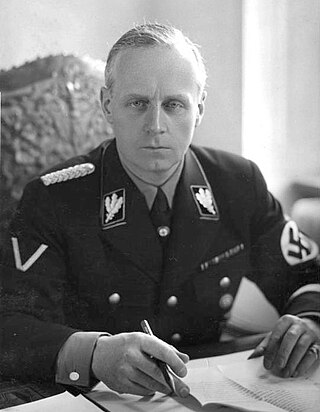
Ulrich Friedrich-Wilhelm Joachim von Ribbentrop was a German politician and diplomat who served as Minister of Foreign Affairs of Nazi Germany from 1938 to 1945.

Timothy Sydney Robert Hardy was an English actor who had a long career in theatre, film and television. He began his career as a classical actor and later earned widespread recognition for roles such as Siegfried Farnon in the BBC television series All Creatures Great and Small, Cornelius Fudge in the Harry Potter film series and Winston Churchill in several productions, beginning with the Southern Television series Winston Churchill: The Wilderness Years. He was nominated for the BAFTA for Best Actor for All Creatures Great and Small in 1980 and Winston Churchill: The Wilderness Years in 1982. Aside from acting, Hardy was an acknowledged expert on the medieval English longbow and wrote two books on the subject.

A History of the English-Speaking Peoples is a four-volume history of Britain and its former colonies and possessions throughout the world, written by Winston Churchill, covering the period from Caesar's invasions of Britain to the end of the Second Boer War (1902). It was started in 1937 and finally published 1956–1958, delayed several times by war and his work on other texts. The volumes have been abridged into a single-volume, concise edition.

Brendan Rendall Bracken, 1st Viscount Bracken, PC was an Irish-born businessman, politician and a minister in the British Conservative cabinet. He is best remembered for supporting Winston Churchill during the Second World War. He was also the founder of the modern version of the Financial Times. He was Minister of Information from 1941 to 1945.

Clementine Ogilvy Spencer-Churchill, Baroness Spencer-Churchill,, was the wife of Winston Churchill, Prime Minister of the United Kingdom, and a life peer in her own right. While legally the daughter of Sir Henry Hozier, her mother Lady Blanche's known infidelity and his suspected infertility make her paternal parentage uncertain.

Victor Oliver von Samek was an Austrian-born British musician, entertainer, comedian and actor, most popular between the 1920s and 1950s.
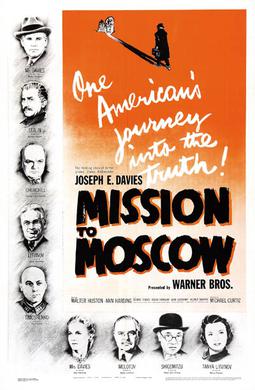
Mission to Moscow is a 1943 propaganda film directed by Michael Curtiz, based on the 1941 book by the former U.S. ambassador to the Soviet Union, Joseph E. Davies.
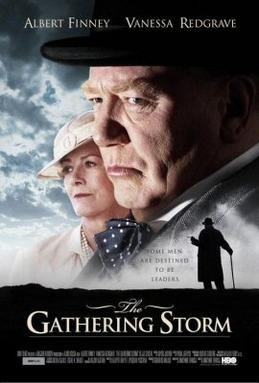
The Gathering Storm is a BBC–HBO co-produced television biographical film about Winston Churchill in the years just prior to World War II. The title of the film is that of the first volume of Churchill's largely autobiographical six-volume history of the war, which covered the period from 1919 to 3 September 1939, the day he became First Lord of the Admiralty.
The Gathering Storm may refer to:

Anton Diffring was a German actor. He had an extensive film and television career in the United Kingdom from the 1940s to the 1980s, latterly appearing in international films. Primarily a character actor, he often played Nazi officers in World War II films, and other antagonistic authority figures.

Young Winston is a 1972 British epic biographical adventure drama war film covering the early years of British Prime Minister Winston Churchill, based in particular on his 1930 book, My Early Life. The first part of the film covers Churchill's unhappy schooldays, up to the death of his father. The second half covers his service as a cavalry officer in India and the Sudan, during which he takes part in the cavalry charge at Omdurman, his experiences as a war correspondent in the Second Boer War, during which he is captured and escapes, and his election to Parliament at the age of 26.
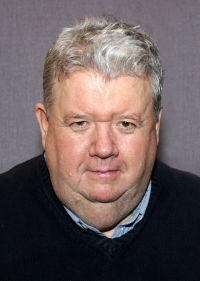
Ian McNeice is an English film and television actor, best known for playing Bert Large in the dramedy Doc Martin. He found fame portraying government agent Harcourt in the 1985 television series Edge of Darkness, and went on to feature in popular films such as The Englishman Who Went up a Hill but Came down a Mountain, Ace Ventura: When Nature Calls and Frank Herbert's Dune.

That Hamilton Woman, also known as Lady Hamilton, is a 1941 black-and-white historical film drama produced and directed by Alexander Korda for his British company during his exile in the United States. Set during the Napoleonic Wars, the film tells the story of the rise and fall of Emma Hamilton, dance-hall girl and courtesan, who married Sir William Hamilton, British ambassador to the Kingdom of Naples, and later became Admiral Horatio Nelson's mistress.

The Second World War is a history of the period from the end of the First World War to July 1945, written by Winston Churchill. Churchill labelled the "moral of the work" as follows: "In War: Resolution, In Defeat: Defiance, In Victory: Magnanimity, In Peace: Goodwill".
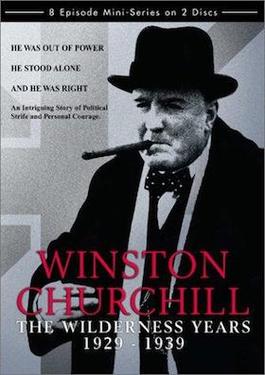
Winston Churchill: The Wilderness Years is an eight-part 1981 drama serial based on Winston Churchill's years in enforced exile from political position during the 1920s and 1930s. It was made by Southern Television on a budget of £3¼ million and originally broadcast on ITV on Sunday nights at 10 pm. It was written and directed by Ferdinand Fairfax, with historian Martin Gilbert as co-writer. Churchill was played by Robert Hardy, who earned a BAFTA nomination for Best Actor and went on to play him in several other productions.

Named the Greatest Briton of all time in a 2002 poll, and widely regarded as being among the most influential people in British history, Winston Churchill has been regularly portrayed in film, television, radio and other media. The depictions range from minor character to the biographical centerpiece, exceeding 30 films, more than two dozen television shows, several stage productions, and countless books.
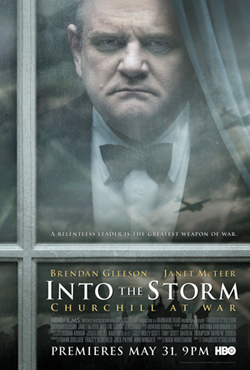
Into the Storm or Churchill at War(alt. title) is a 2009 biographical film about Winston Churchill and his days in office during the Second World War. The movie is directed by Thaddeus O'Sullivan and stars Brendan Gleeson as the British Prime Minister. Into the Storm is a sequel to the 2002 television film The Gathering Storm, which details the life of Churchill in the years just prior the war. Into the Storm had its first public premiere on HBO and HBO Canada on 31 May 2009.

On 11 December 1941, four days after the Japanese attack on Pearl Harbor and the United States declaration of war against the Japanese Empire, Nazi Germany declared war against the United States, in response to what was claimed to be a "series of provocations" by the United States government when the U.S. was still officially neutral during World War II. The decision to declare war was made by Adolf Hitler, apparently offhand, almost without consultation. It has been referred to as Hitler's "most puzzling" decision of World War II. Publicly, the formal declaration was made to American Chargé d'Affaires Leland B. Morris by German Foreign Minister Joachim von Ribbentrop in the latter's office. Later that day, the U.S. declared war on Germany, with Germany's action having eliminated any remaining meaningful domestic isolationist opposition to the U.S. joining the European war.
The following events occurred in March 1940:
Cultural depictions of prime ministers of the United Kingdom have become commonplace since the term's first use in 1905. However, they have been applied to prime ministers who were in office before the first use of the term. They are listed here chronologically from the date of first appointment as prime minister.

















